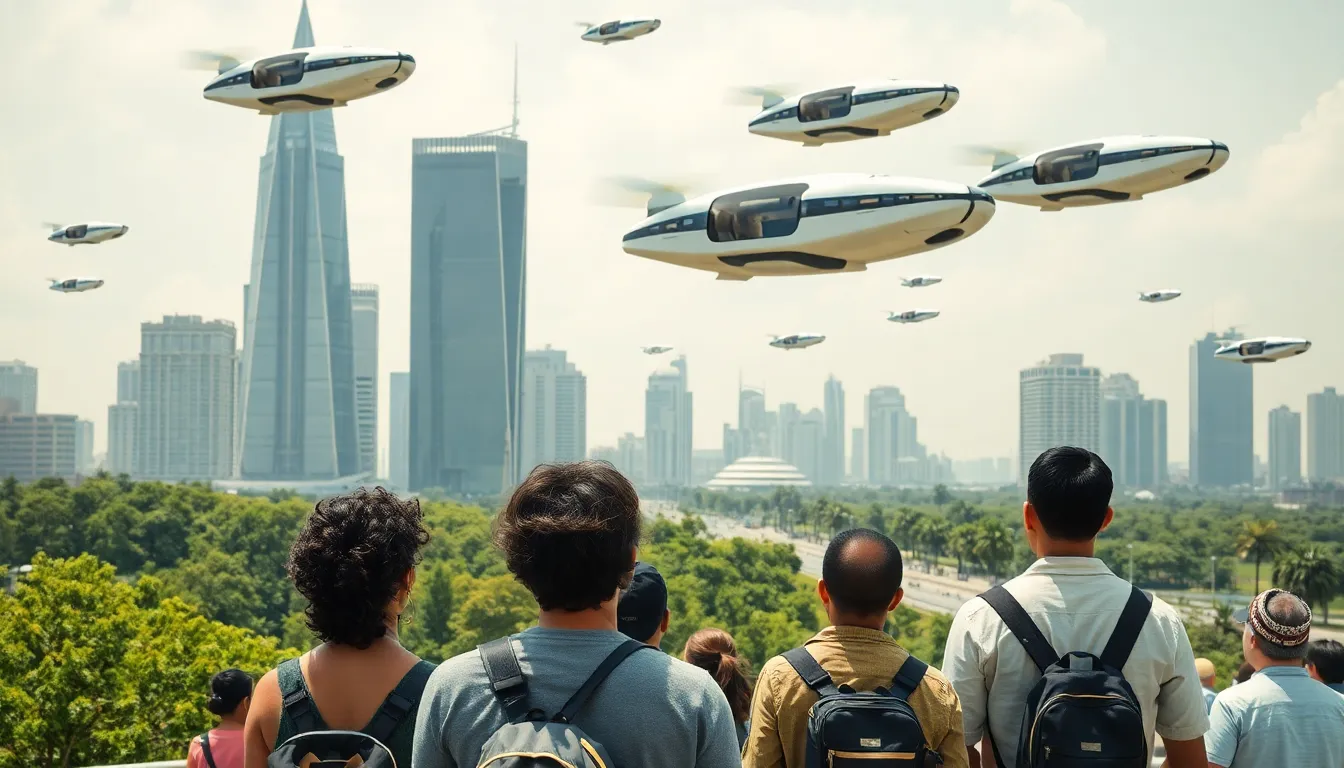Imagine a world where flying cars are as common as coffee shops and robots do the heavy lifting while you sip your latte. Life in the future promises to be a wild ride, blending technology and daily living in ways that’ll make today’s conveniences look like caveman tools. From AI companions that know your coffee order to smart homes that anticipate your every need, the future is shaping up to be a playground of possibilities.
But hold on to your hoverboards—it’s not just about gadgets and gizmos. This future landscape will challenge our ideas about work, relationships, and even leisure. As humanity embraces these changes, the question looms: are we ready for a life where the mundane becomes extraordinary? Buckle up as we explore the quirks and wonders of life in the not-so-distant future, where the only constant is change—and maybe a little chaos.
Table of Contents
ToggleOverview of Life in the Future
Life in the future promises significant transformations driven by technology. Advanced tools, including flying cars and AI companions, introduce astonishing changes to daily routines. One can expect smart homes to become the norm, optimizing comfort and convenience. Enhanced connectivity facilitates seamless integration of technology into even the simplest tasks.
Work environments will evolve as automation replaces traditional jobs. Remote work capabilities expand, allowing individuals to collaborate globally without geographical limitations. New industries may emerge, focusing on AI development and sustainable technologies. These transitions spark discussions about job security and the need for upskilling.
Relationships could shift as social interactions take place in virtual spaces. Individuals might connect through holographic meetings or augmented reality experiences. This change prompts questions about the authenticity of relationships and personal connections.
Leisure activities diversify, fueled by virtual reality and immersive experiences. Entertainment options may range from fully interactive games to virtual travel experiences, providing unique opportunities for exploration.
Environmental sustainability gains importance in future innovations. Clean energy sources and eco-friendly materials become standard in urban design and transportation. Smart cities may prioritize green spaces, improving residents’ quality of life.
Adaptability emerges as a key trait in navigating this ever-changing landscape. Individuals face the challenge of accepting rapid advancements while finding balance in their daily lives. Embracing these changes shapes a future where extraordinary becomes the new normal.
Technological Advancements

As technology continues to evolve, significant changes in everyday life appear inevitable.
AI and Robotics
AI will revolutionize various sectors by enhancing efficiency and reducing human error. Robots will handle tasks ranging from simple household chores to complex surgical procedures. Automation will streamline manufacturing processes and improve precision in various industries. They will contribute to personalized experiences, with virtual assistants learning individual preferences over time. Additionally, collaboration between humans and AI will open up new avenues for creativity and productivity. Innovations in robotics will also ensure safety in hazardous environments like disaster response scenarios.
Transportation Innovations
Transportation is set for groundbreaking transformations through technological innovations. Flying cars may become commonplace, significantly reducing travel time for urban commuters. Public transportation will benefit from AI, optimizing routes and schedules to minimize delays. Electric vehicles will gain traction, supporting a green transition aimed at lowering carbon footprints. Autonomous vehicles will enhance road safety by minimizing accidents caused by human errors. Lastly, hyperloop systems could revolutionize long-distance travel, cutting journey times dramatically while promoting environmental sustainability.
Environmental Changes
Environmental changes will shape life in the future, significantly impacting society and habitats. Society will witness numerous transformations that tackle climate change and promote sustainable practices.
Climate Impact
Climate change will pose major challenges in urban environments, leading to more frequent and intense weather events. Rising sea levels threaten coastal cities, resulting in displacement and infrastructure redesign. Many regions will face increased droughts that will stress water supplies and agricultural production. Adaptations like green architecture will aim to combat these effects, integrating nature into urban planning. Resilient ecosystems will become essential to maintaining biodiversity. Communities will promote carbon neutrality by investing in clean energy solutions, focusing on technologies like solar and wind power. Awareness campaigns will educate citizens about their carbon footprints, driving collective action towards sustainability.
Sustainable Living
Sustainable living will become a core principle in future lifestyles. Communities will emphasize minimal waste and resource conservation, leading to a circular economy. Urban designs will incorporate green roofs and community gardens, enhancing air quality and biodiversity. Smart homes will optimize energy usage, employing advanced technologies to monitor and manage resources efficiently. Transportation options will shift towards electric vehicles and shared mobility solutions, significantly reducing emissions. Individuals will prioritize locally sourced products, supporting sustainable agriculture and reducing the carbon footprint associated with transportation. The integration of eco-friendly materials in construction will transform building practices, ensuring long-lasting and environmentally responsible infrastructures.
Social Dynamics
Social dynamics in the future reflect significant transformations in work, education, and relationships influenced by technology. Interactions among individuals will evolve alongside advancements that reshape daily life.
Changes in Work and Education
Remote work becomes standard as automation alters traditional job structures. Employees leverage AI for productivity, completing tasks efficiently and focusing on creative aspects of their roles. New industries emerge, emphasizing sustainable technology and requiring continuous education. Learning adapts, with online courses and virtual classrooms enhancing accessibility. Upskilling programs ensure that individuals remain competitive and equipped for changing job markets.
Evolving Relationships
Relationships shift towards virtual platforms, where holographic meetings and augmented reality experiences redefine social interactions. Authentic connections may face challenges amid online communication’s rise. People prioritize meaningful engagements, adapting their social lives to include diverse, immersive experiences. Local communities become vital in fostering interpersonal relationships, as shared interests bring individuals together. Families leverage technology for connectivity, maintaining close bonds despite physical distances.
Health and Well-being
Future health and well-being will greatly benefit from technological advancements. Innovative medical technologies will enhance diagnostics and treatment methods.
Advances in Medicine
Robotic surgeries will become more precise, reducing recovery times for patients. Gene editing tools like CRISPR will potentially eradicate genetic disorders, providing a healthier future. Telemedicine will expand access to healthcare, allowing patients to consult specialists from home. Wearable health devices will monitor vital signs continuously, alerting users to potential health issues. AI-driven algorithms will analyze patient data for personalized treatment plans. Innovations in pharmaceuticals will yield targeted therapies, minimizing side effects. Overall, these advancements promise significant improvements in life expectancy and quality of care.
Mental Health Considerations
Mental health will gain increased recognition and prioritization in society. Digital platforms will offer on-demand access to therapy, making mental health support more reachable. Virtual reality therapy may assist in treating conditions such as PTSD and anxiety. Communities will foster supportive environments, reducing stigma around mental health issues. Mindfulness apps will guide individuals toward better emotional resilience. Regularly engaging in mental health check-ins will become commonplace, ensuring people remain aware of their well-being. Funding for mental health initiatives will likely see a rise, reflecting its growing importance in public health conversations.
Life in the future promises to be a remarkable blend of technology and sustainability. As advancements reshape daily routines and social interactions, individuals will need to adapt to new norms while prioritizing meaningful connections. The focus on sustainability will drive communities to embrace eco-friendly practices, ensuring a healthier planet for generations to come.
Health and well-being will also take center stage, with technology enhancing access to care and personalizing treatment. As society navigates this evolving landscape, the ability to balance innovation with authenticity will define the future experience. Embracing change will be key, as individuals and communities work together to create a world where the extraordinary is not just envisioned but lived.

